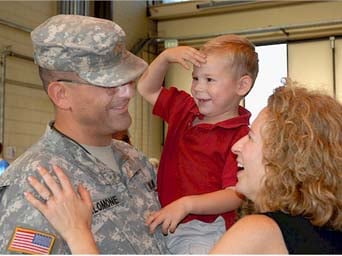 Spouse Telephone Support Program Demonstrates Improved Quality of Life
Spouse Telephone Support Program Demonstrates Improved Quality of Life
WASHINGTON (Nov. 18, 2011) – The Department of Veterans Affairs is implementing a telephone support program to help the spouses of returning Iraq and Afghanistan Veterans, after a pilot telephone support program showed significant reduction in stress for spouses.
“Returning to civilian life after living in constant combat readiness can be a shocking transition, and it is the immediate family, the spouses and children, who bear that brunt of that transition with those who served,” said Secretary of Veterans Affairs Eric K. Shinseki. “The more support we can provide to the family, the better the outcome will be for our Veterans.”
The spouse telephone support program, which is part of VA’s Caregiver Support Program, builds spouses’ ability to cope with the challenges that reintegration to civilian society can bring, helps them serve as a pillar of support for returning Veterans, and eases the transition for families after deployments. Spouses in the pilot program reported decreased symptoms of depression and anxiety, with an increase in social support.
Spouses participate in 12 telephone support groups over six months. The focus is on problem-solving and communication, relationships, mental health and resilience. A trained, nationwide team of VA medical center staff members, including many caregiver support coordinators, will lead the support groups.
Typical issues spouses and Veterans face after deployment include communication difficulties, the need to renegotiate family roles and responsibilities and the added stress of combat related injury. Spouses of Veterans returning from Iraq and Afghanistan have reported feeling overwhelmed, depressed, anxious and frustrated.
“Providing support to family caregivers is the right thing for VA to do,” said Dr. Robert Petzel, VA’s under secretary for health. “A simple series of phone calls can do so much good. Certainly, those who fought for our nation and the spouses who allowed them to make that sacrifice deserve this support.”
The program is based on research by VA researchers Dr. Linda Nichols and Dr. Jennifer Martindale-Adams, of the Memphis VA Medical Center and the University of Tennessee Health Science Center. Both researchers developed and studied interventions for family members of Veterans and military personnel. Their work with spouses of post-deployed and deployed military personnel is funded through the Defense Health Program, managed by the U.S. Army Medical Research and Materiel Command.
Local caregiver support coordinators are available to assist Veterans and their caregivers in understanding and applying for VA’s many caregiver benefits. VA also has a Web page, www.caregiver.va.gov, with general information on spouse telephone support and other caregiver support programs available through VA and the community.
ATTENTION READERS
We See The World From All Sides and Want YOU To Be Fully InformedIn fact, intentional disinformation is a disgraceful scourge in media today. So to assuage any possible errant incorrect information posted herein, we strongly encourage you to seek corroboration from other non-VT sources before forming an educated opinion.
About VT - Policies & Disclosures - Comment Policy



